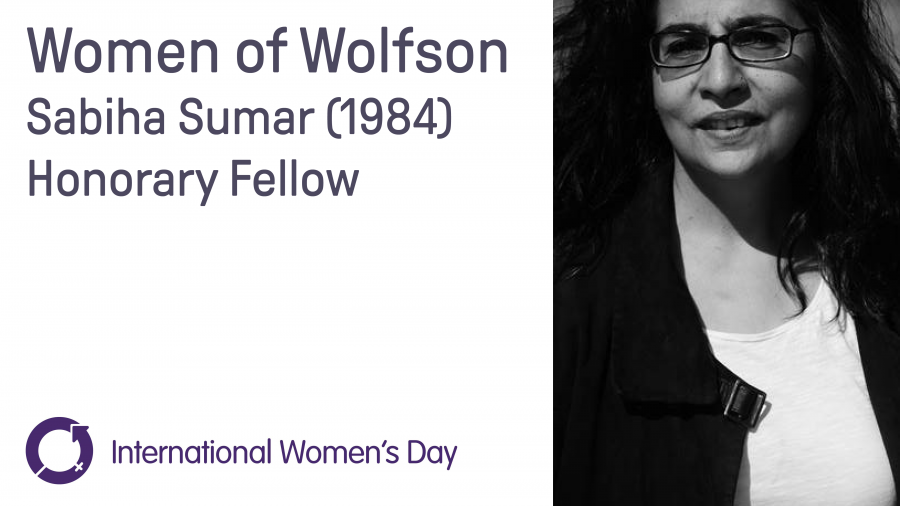How to rebuild a city with Karam Alkatlabe


For International Women’s Day 2019, Awa Farah (MPhil African Studies, 2017) caught up with three Wolfson College alumnae, starting with filmmaker and Honorary Fellow Sabiha Sumar (MPhil International Relations, 1984).

From producing the Oscar-winning documentary ‘Saving Face’, to her latest independent short documentary ‘Azmaish: A Journey through the Subcontinent’, which explores two women’s journey through India and Pakistan, Sumar’s work has received international acclaim and garnered a global audience. We discuss the overarching theme of gender and identity in her films, the role of women in filmmaking and the key to finding balance.
You’ve had quite a varied career since leaving Wolfson College - tell us what got you into filmmaking?
I have always been interested in communicating stories through film and it seemed to be the only medium that fascinated me. I remember telling my father at a young age that I wanted to become a filmmaker and his advice to me was to immerse myself in the world of ideas, and that through education I could apply these thoughts into my films. My education and interest in politics, philosophy and literature were all important in my journey.
A lot of your films address topics surrounding identity, gender and home – why are these topics so important to portray in your films?
I didn’t start out saying I’m going to make a film that discusses these topics. I try to bring my lived experiences and memories into the films I make. In the process, I look at the things that touched me and made an impact in my life. I travel a lot and have talked with lots of interesting people such as farmers, rickshaw drivers and refugees- these conversations impacted me and stayed with me throughout my life. It is only 10 or 15 years down the line that I recalled them in my memory and decided they would be interesting stories to tell. My focus on females came out of simply meeting very complex and interesting women whose stories I wanted to represent in my films. It’s not a consciously crafted decision but a very organic process, as I just find myself naturally drawn to these stories.
The theme for this year’s International Women’s Day is #balanceforbetter. What do you believe is the key to finding balance?
That’s a very difficult question. As a mother, I cannot say that I am at peace with finding the perfect balance between work and motherhood. There are times when I say; I will give myself two months to write a script and two months away from writing to spend just with my children. I wish I could say I just want to be a mother and not do films but that is not the case, so I try to manage my time better. But I am constantly trying to find balance in my life.
Any advice for students currently struggling to find balance?
As a student you constantly have to deal with the complexity of life and balance. Something that has really helped me is giving myself some quiet time. I practise meditation which has helped me to feel more grounded, and has calmed the feeling of being constantly overwhelmed. I think it is important to be alone and listening to yourself.
What would you say are the main challenges of being a woman in filmmaking?
Working in the filmmaking industry is difficult as Pakistan doesn’t have a great film infrastructure. On top of that, I think as a woman you always feel you constantly need to prove yourself. On one hand, when I was starting out people would not take me seriously and not feel threatened by me because I was a woman, which opened up a lot of doors for me. However, it was only when I started making successful films that that attention was brought to me in a negative way. It’s been a hard task but I am happy for the experience to learn and grow as an individual and filmmaker.
How can the industry initiate change for women in film?
One place to start would be to provide filmmakers with more funding opportunity and support. In recent years, I have been side-lined because I am not telling “their” story, the man’s story. What we need are more women in film, telling the stories of women in our society. It continues to be constant struggle for us to tell these as they defy the standard way of telling stories. In the society I live in, it is often glamorised to tell the story of docile women. I want portray stories of hope and change in my films.
Which female (living or historical) has inspired you the most?
I have always been inspired by critical story tellers in Pakistani film, such as female writer Noor ul Huda Shah and Director Saira Kazmi. They tell stories from a human perspective, which can resonate with anyone.
What projects have you got planned for the future?
I am currently working on two projects. A series set in London about three women from three different backgrounds, and a documentary that follows a female motorcyclist through her journey from Europe to Pakistan.







